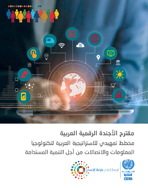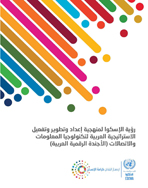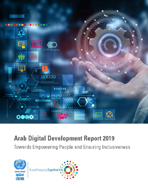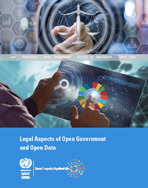Enabling Environment

In the contemporary digital economy, affordable and efficient access for all to information and modern services is fundamental. No single entity has control over information or the means of its distribution. Security concerns must be balanced by openness and freedom of choice. Intellectual property rights need to be protected in order to facilitate fair exchange. These concerns make collective governance critical. ESCWA is well placed to help Arab countries to tackle governance and cross-boundary matters.
Arab Dialogue on Internet Governance
Following five global events of the Internet Governance Forum (IGF) between 2006 and 2010, the IGF proved to be a suitable discussion medium that provides all stakeholders with a platform to exchange expertise and plan the way ahead. At the fifth IGF held in September 2010, there was consensus on the need to renew the mandate for five more years as justified in the General Assembly resolution A/RES/64/187 on information and communication technologies for development.
In order to ensure appropriate participation and positioning of the Arab region in the Internet governance arena, Arab countries are in need to take far-reaching commitments and policy measures. Within this framework, ESCWA and the League of Arab States launched the Arab Dialogue on Internet Governance (ArabDIG) initiative in order to consolidate efforts and harmonize implementation of activities that assist Arab countries in reaching common Internet governance goals.
ArabDIG is multi-stakeholder in nature and aims primarily at: (a) providing a better understanding of common challenges and prospects of Internet governance from the perspective of the Arab region; (b) building capacity of Arab countries to respond to those challenges; (c) enabling Arab countries to seize opportunities to bring their views and needs to the global arena, hence shaping an optimum global policy structure for Internet governance; and (d) Promoting Arab countries’ role as effective players in the global Internet society.
Arab IGF Process
ESCWA and the League of Arab States launched the Arab IGF process in 2012. It is coordinated through a central secretariat hosted by the National Telecommunication Regulatory Authority of Egypt. Its programmes are developed by experts on the Arab IGF Multistakeholder Advisory Group (AMAG). The Executive Bureau for Joint Coordination was formed in 2013 as a decision-making body.
The Arab IGF addresses key Internet governance issues, including: access; Internet infrastructure and critical resources; international and national Internet policy; security and privacy; rights and responsibilities; and Internet and youth.
Arab IGF website and social media links: http://igfarab.org; www.facebook.com/ArabIGF; www.twitter.com/igfarab.
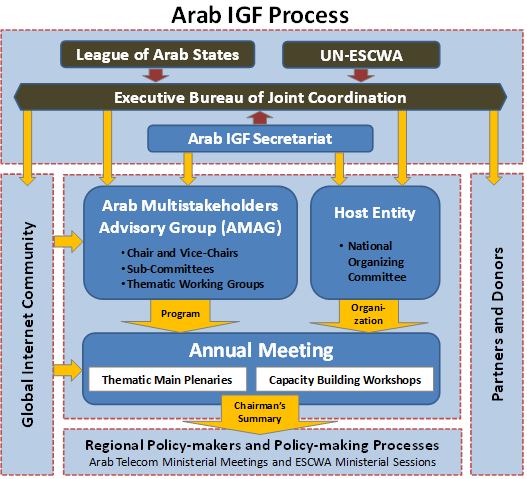
Harmonization and development of cyber legislation in the Arab Region
ICTs open up new opportunities but are not free of risk. A concerted effort is needed to short-circuit threats to the Internet and shield the growing number of Internet users from falling victim to cybercrime.
Comprehensive cyber legislation frameworks and solid institutions will be crucial to building the information society and knowledge-based economy in the Arab region. ESCWA has been working to that end since 2007. In the framework of its Regional harmonization of cyber legislation to promote the knowledge society in the Arab world project (2009 – 2012), ESCWA published cyber legislation directives to assist member States in developing and harmonizing their national laws. They cover: personal data protection, e-communication and free expression, e-signature and e-transactions, e-commerce and consumer protection, intellectual property, and cybercrimes. For more information, visit the ESCWA information society portal at: http://isper.escwa.un.org/FocusAreas/CyberLegislation/tabid/157/language/en-US/Default.aspx.






